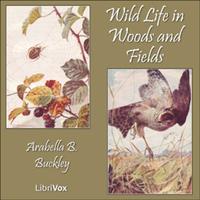THE WOODPECKER'S NEST
WE were lying under the shade of the trees in the wood one afternoon. All was very quiet, when suddenly we heard such a strange cry. It was like someone laughing "Yaffil, Yaffil, Yaffil." "That is the woodpecker," said Peggy. "Wait and see what he will do." So we lay quite still under the tree. Soon the sound came nearer, and a great heavy bird, bigger than a large thrush, flew towards us. He was a beautiful bird. His wings were green, and so was his breast. He had yellow on his tail. His head was red, and he had a red streak on his throat. His beak was long and grey.
He came quite close to us, hopping along. Then he stopped, and a long shining tongue came out of his mouth, and went back so quickly that we could scarcely see it.
"He is eating ants," said Peggy. "The tip of his tongue is sticky and he draws them into his mouth." Then he began to climb the tree so funnily. His tail is quite stiff and wiry, and he bent it against the tree, and pushed himself up, jump, jump, holding on with his sharp hooked toes. He jumped first to the right, then to the left. Then he ran round the tree and came out on the other side.
All the while he was trying the bark with his beak. Tap, tap, tap. At last he found a soft spot. Then he tore off the bark and ate the grubs, which had made the tree rotten in that place. After this he came down the tree again.
It was so funny to see him. He came down backwards tail first, using it to steady himself. Then he spread his wings and flew slowly away.
We crept after him, and by-and-by he stopped at an old elm tree and flew round it. Then we could see no more of him.
"His nest must be in this tree," said Peter. "Give me a back, Paul, and I will soon find it." So Paul let Peter climb on his back till he could reach the branches of the tree. Then Peter caught hold of the boughs, and crept round the trunk.
"Here it is," he cried at last. "There is a small hole, just big enough for a bird to creep in. But they have made such a big hole inside the tree. I can only just reach down." The Peter drew his hand back with the mother bird in it. Her head was not so red as the father's, and she had no red whiskers. He let her fly away and then pulled out six white shining eggs.
"I can feel a number of soft chips of wood at the bottom of the hole," said he. "Shall I put the eggs back?" "Of course," said Paul; "then the mother will fly back and sit on them, and we will come again and see the little birds when they are hatched." So we went away. But every day, as we came from school, we turned aside to see if the little woodpeckers had come out of their shells.
At last one day we saw the old woodpeckers carrying insects into the hole. After some time we saw the young birds out on the tree. They could not fly. But they ran about the branches, and jumped so funnily with their stiff tails.
A week later we saw them flying about, and when we came again they were all gone. Peter climbed up and found the nest quite empty.

